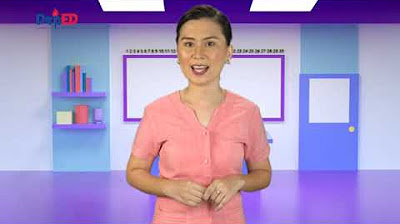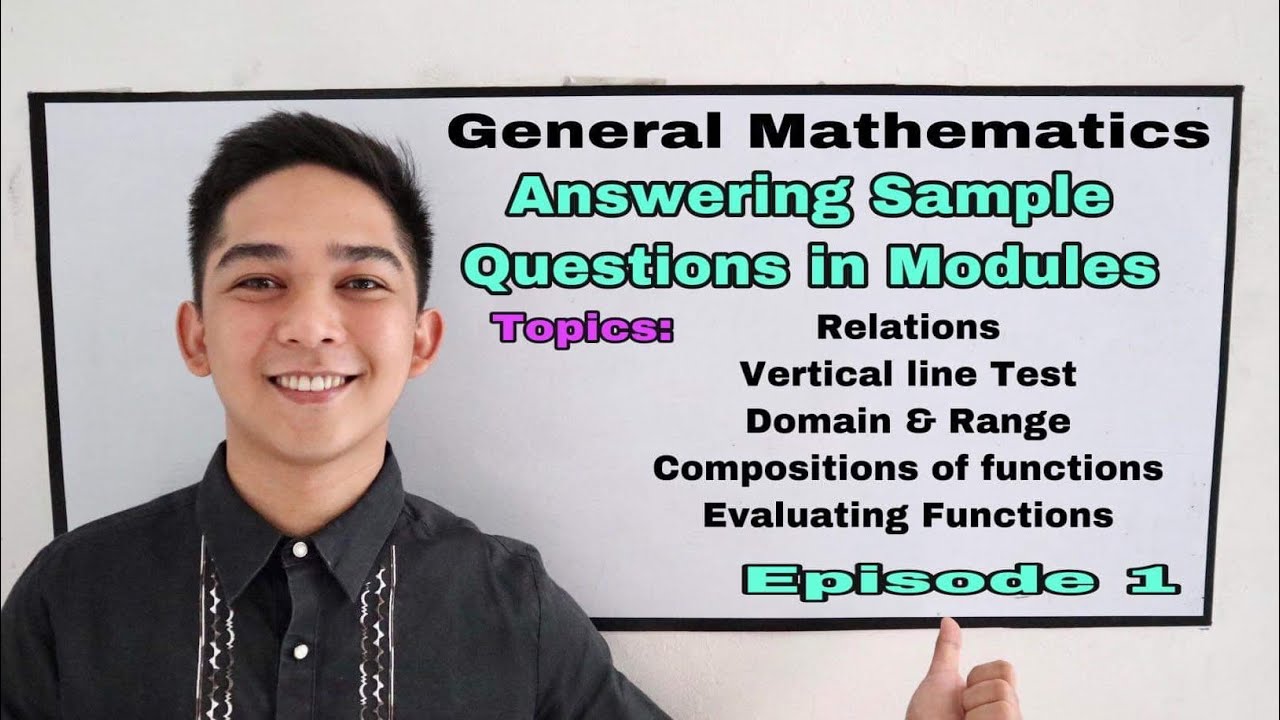FUNCTIONS | SHS GRADE 11 GENERAL MATHEMATICS QUARTER 1 MODULE 1 LESSON 1
Summary
TLDRThis video script introduces a high school general mathematics lesson for grade 11, focusing on real-life functions. It sets three objectives: understanding functions and relations, illustrating functions through mapping diagrams, sets, and graphs, and representing real-life situations with functions. The lesson uses a crossword puzzle to review key terms and emphasizes that a function is a special kind of relation where each input value is associated with exactly one output value. Examples of mapping, sets, and the vertical line test in graphing are provided to identify functions. The script concludes with real-life function examples and a 10-item assessment to reinforce learning.
Takeaways
- 📝 The lesson is designed for 11th-grade general mathematics, focusing on real-life functions.
- 📚 Students are encouraged to prepare a paper and pen to write down their answers and solutions to problems presented in the video.
- 🔍 The importance of pausing and revisiting the video for mastery is emphasized, allowing for a flexible learning pace.
- 🎯 The lesson has three main objectives: to determine functions and relations, illustrate functions through mapping diagrams, sets, and graphs, and represent real-life situations using functions.
- 🔑 A crossword puzzle is used to recall essential terms from junior high school mathematics, which are crucial for understanding the new material.
- 🔍 The definition of a function is highlighted as a special kind of relation where every element in the domain is paired with exactly one element in the range.
- 📈 Mapping diagrams are introduced as a tool to visually represent how elements of a function are paired, aiding in understanding the concept of functions.
- 📊 The concept of the domain and range in functions is explained, with examples provided to illustrate how to identify them within sets of ordered pairs.
- ✅ The vertical line test (VLT) is introduced as a method to determine if a graph represents a function, where only one point of intersection with any vertical line is allowed.
- 🌐 Real-life examples of functions are given, such as the relationship between the circumference of a circle and its diameter, the length of a shadow and a person's height, and the location of a car as a function of time.
- 📝 A 10-item assessment is provided at the end of the lesson to check students' understanding of the material covered.
Q & A
What are the three main objectives of the lesson on real life functions?
-The three main objectives are to determine functions and relations, illustrate functions through mapping diagrams, sets, and graphs, and represent real life situations using functions.
What is the definition of a 'relation' in the context of this lesson?
-A relation is a rule that relates values from a set of values, known as the domain, to a second set of values, known as the range.
What is an 'ordered pair' and how is it represented?
-An ordered pair is a sequence of two elements, typically enclosed in parentheses and separated by a comma, representing a specific order of elements.
What is the 'domain' of a function and how is it determined?
-The domain of a function is the set of all input values or the first elements of the ordered pairs in the set of ordered pairs representing the function.
What is the 'range' of a function and how is it determined?
-The range of a function is the set of all output values or the second elements of the ordered pairs in the set of ordered pairs representing the function.
What is a 'function' in mathematical terms and what is its defining rule?
-A function is a special kind of relation where every element in the domain is associated with exactly one element in the range, meaning each x value is paired with only one y value.
How can you determine if a given set of ordered pairs represents a function using the mapping diagram?
-In a mapping diagram, check if every element in the domain is associated with only one value in the range. If so, the set represents a function.
What is the 'Vertical Line Test' (VLT) and how is it used to determine if a graph represents a function?
-The Vertical Line Test (VLT) is a method used in graphing to determine if a graph represents a function by checking if any vertical line would touch the graph at more than one point. If it does, the graph does not represent a function.
What is the circumference of a circle as a function of its diameter and how is it represented mathematically?
-The circumference of a circle is a function of its diameter and can be represented as \( C = \pi D \) or as a function of its radius as \( C = 2\pi r \).
Can you provide an example of a real-life function from the script?
-One example from the script is the length of a person's shadow on the floor, which is a function of their height.
What is the significance of the Vertical Line Test in identifying functions from graphs?
-The significance of the Vertical Line Test is that it provides a visual and straightforward method to determine if a graph represents a function by ensuring that no vertical line intersects the graph more than once.
Outlines

此内容仅限付费用户访问。 请升级后访问。
立即升级Mindmap

此内容仅限付费用户访问。 请升级后访问。
立即升级Keywords

此内容仅限付费用户访问。 请升级后访问。
立即升级Highlights

此内容仅限付费用户访问。 请升级后访问。
立即升级Transcripts

此内容仅限付费用户访问。 请升级后访问。
立即升级浏览更多相关视频

(Part 1) FUNGSI KOMPOSISI DAN FUNGSI INVERS MATEMATIKA SMA KELAS 11 #kurikulummerdeka #matematikasma

SHS General Mathematics Q1 Ep1: Function

CARA MUDAH FUNGSI KOMPOSISI

SHS General Mathematics Q1 Ep2: Rational Functions

EPISODE 1- GENERAL MATHEMATICS : Answering Sample Questions in Modules

Daerah Asal Alami Fungsi Rasional dan Fungsi Irasional - Matematika SMA Kelas XI Kurikulum Merdeka
5.0 / 5 (0 votes)
